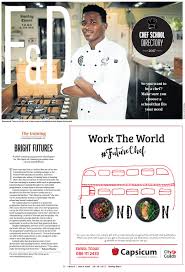Chef Training Courses: Igniting Culinary Excellence
Embarking on a journey to become a chef is not just about mastering the art of cooking; it’s about honing your skills, embracing creativity, and cultivating a passion for gastronomy. Chef training courses offer aspiring culinary enthusiasts the opportunity to delve deep into the world of food and beverage, equipping them with the knowledge and expertise needed to thrive in the competitive culinary industry.
Whether you dream of owning your own restaurant, working in a prestigious hotel kitchen, or showcasing your talents on a global stage, enrolling in a chef training course can be the first step towards turning your culinary aspirations into reality.
The Benefits of Chef Training Courses
Chef training courses provide a structured learning environment where students can develop their culinary skills under the guidance of experienced chefs and industry professionals. These courses often cover a wide range of topics, including knife skills, food safety and hygiene, menu planning, flavour profiling, plating techniques, and more.
Hands-on practical experience is a key component of chef training courses, allowing students to apply theoretical knowledge in real-world kitchen settings. From mastering classic cooking techniques to experimenting with innovative flavour combinations, students have the opportunity to unleash their creativity and develop their own unique culinary style.
Choosing the Right Chef Training Course
When selecting a chef training course, it’s essential to consider factors such as accreditation, curriculum structure, faculty expertise, industry partnerships, and hands-on training opportunities. Whether you opt for a short-term certificate programme or a comprehensive diploma course, ensure that the curriculum aligns with your career goals and interests.
Many chef training courses also offer specialisations in areas such as pastry arts, international cuisine, sustainable cooking practices, and more. By choosing a course that matches your passion and career aspirations, you can tailor your learning experience to suit your individual goals.
Unlock Your Culinary Potential
Embarking on a chef training course is not just about acquiring technical skills; it’s about fostering creativity, embracing teamwork, and developing an unwavering dedication to excellence. Whether you’re an amateur cook looking to sharpen your skills or an aspiring professional seeking to launch your culinary career, chef training courses provide the perfect platform to ignite your culinary passion and unlock your full potential.
Five Essential Tips for Selecting and Excelling in Chef Training Courses
- Choose a reputable culinary school with experienced instructors.
- Practice your cooking skills regularly to improve and refine your techniques.
- Learn about different cuisines and cooking styles to broaden your knowledge and expertise.
- Develop good time management and organizational skills to handle the fast-paced environment of a professional kitchen.
- Seek opportunities for hands-on experience through internships or apprenticeships in restaurants or catering establishments.
Choose a reputable culinary school with experienced instructors.
When embarking on chef training courses, it is crucial to select a reputable culinary school with experienced instructors. The expertise and guidance provided by seasoned chefs can significantly impact your learning journey, offering valuable insights, mentorship, and industry knowledge that are essential for honing your culinary skills. By choosing a culinary school with a strong reputation and a faculty of experienced instructors, you can ensure that you receive top-notch training and guidance to help you excel in the competitive world of gastronomy.
Practice your cooking skills regularly to improve and refine your techniques.
To excel in chef training courses, it is crucial to dedicate time to practising your cooking skills consistently. Regular practice not only helps you improve your culinary techniques but also allows you to refine your skills and develop a deeper understanding of various cooking methods. By honing your abilities through frequent practice sessions, you can build confidence in the kitchen, enhance your creativity, and ultimately strive towards culinary excellence.
Learn about different cuisines and cooking styles to broaden your knowledge and expertise.
Exploring diverse cuisines and cooking styles is a fundamental tip for aspiring chefs undergoing training courses. By immersing oneself in the rich tapestry of global culinary traditions, individuals can broaden their knowledge, deepen their understanding of flavour profiles, and expand their repertoire of techniques. Understanding the nuances of various cuisines not only enhances creativity in the kitchen but also fosters a deeper appreciation for cultural diversity and culinary heritage. Embracing different cooking styles allows aspiring chefs to develop a versatile skill set that transcends boundaries and enables them to craft innovative and inspired dishes that resonate with diners worldwide.
Develop good time management and organizational skills to handle the fast-paced environment of a professional kitchen.
In the realm of chef training courses, cultivating strong time management and organisational skills is paramount to navigating the dynamic and high-pressure setting of a professional kitchen. The ability to efficiently plan, prioritise tasks, and coordinate workflows is essential for ensuring seamless operations and delivering top-notch culinary creations amidst the hustle and bustle of a fast-paced culinary environment. By honing these vital skills, aspiring chefs can not only thrive in the demanding world of gastronomy but also elevate their efficiency, productivity, and success in the culinary industry.
Seek opportunities for hands-on experience through internships or apprenticeships in restaurants or catering establishments.
Seeking opportunities for hands-on experience through internships or apprenticeships in restaurants or catering establishments is a valuable tip for those pursuing chef training courses. By immersing oneself in a real kitchen environment, aspiring chefs can gain practical skills, refine their techniques, and observe firsthand the day-to-day operations of a professional culinary setting. These experiences not only provide invaluable mentorship from seasoned chefs but also offer a glimpse into the fast-paced and dynamic nature of the culinary industry, preparing individuals for the challenges and rewards that come with pursuing a career in gastronomy.

